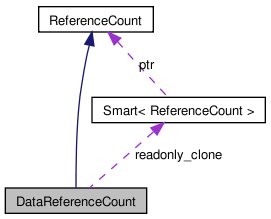DataReferenceCount Class Reference
counts the number of smart pointers referring to it and also keeps a readable/writable flag. More...
#include <data-reference-count.h>
Inherits ReferenceCount.

Public Member Functions | |
| DataReferenceCount () | |
| virtual DataReferenceCount * | clone ()=0 |
| DataReferenceCount & | operator= (const DataReferenceCount &r) |
| virtual DataReferenceCount * | reallocate () |
Public Attributes | |
| Smart< ReferenceCount > | readonly_clone |
Detailed Description
counts the number of smart pointers referring to it and also keeps a readable/writable flag.Definition at line 50 of file data-reference-count.h.
Constructor & Destructor Documentation
| DataReferenceCount::DataReferenceCount | ( | ) | [inline] |
Definition at line 62 of file data-reference-count.h.
Member Function Documentation
| virtual DataReferenceCount* DataReferenceCount::clone | ( | ) | [pure virtual] |
Should instantiate a copy of this own object through using the copy constructor.
| DataReferenceCount& DataReferenceCount::operator= | ( | const DataReferenceCount & | r | ) | [inline] |
should make all the values in this object read only. Don't assign. Bad idea :)
Definition at line 95 of file data-reference-count.h.
| virtual DataReferenceCount* DataReferenceCount::reallocate | ( | ) | [inline, virtual] |
This function is called to reallocate the specific object The return value must be the new pointer it will become If this is a truly new object we return the same one, otherwise we need to return the old one.
Definition at line 105 of file data-reference-count.h.
Member Data Documentation
if the object is being cloned to a read only copy then this variable will point to the read only clone. This variable is cleared as soon as we write anything to this object;
Definition at line 61 of file data-reference-count.h.
The documentation for this class was generated from the following file:
 1.5.9
1.5.9